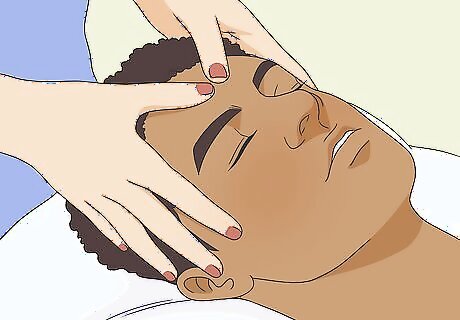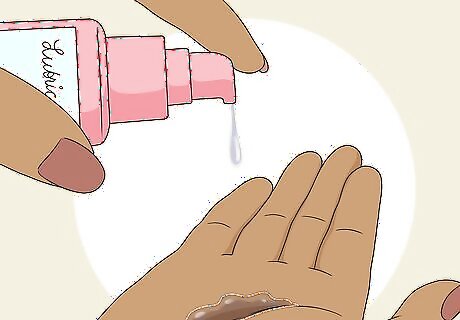
views
Communicate with your partner.

Be honest about your sexual wants and needs. In order to have sex that’s both pleasurable and satisfying for you and your partner, it’s important to be honest with one another about what you want and any worries you may have. Use clear and concise language to talk about sex with your partner and don’t be afraid to bring up any insecurities you may have. Sex between partners is very much a team effort, so it’s important that you and your partner listen to one another and feel safe expressing your opinions openly. Use “I” language when talking about your personal feelings to avoid sounding like you’re criticizing or accusing your partner of something. For example, you might say things like, “I think kissing and touching outside of the bedroom would help put me in the mood” or “Sometimes I feel insecure about my body and might feel better hearing from you that you’re enjoying yourself.”
Schedule time for intimacy.

Make sex a priority and set aside time for it during the week. It can be hard to have a satisfying and active sex life amidst busy schedules. If you’ve been missing your partner, take some time to sit down together and plan out when you’ll make time for intimacy. Maybe you’ll make it a goal to do it at least once a week or every other week if you’re really busy. The important thing is that you put sex toward the top of your priority list so it doesn't go completely forgotten. Of course, being spontaneous is also a move that can definitely spice up your sex life. If you and your partner have some sudden alone time together, surprise them with some more intimate activities. While each couple’s needs may be different in terms of how frequently they engage in sexual activities, one study showed that couples were happiest when having sex once a week.
Reevaluate how you think about sex.

Let go of ideas about what sex is “supposed to look like.” For some people, feelings of insecurity, worries about their ability to satisfy their partners, and low self-esteem can affect their sex drive. If you find yourself in the same boat, take a step back and sefl-reflect on these thoughts you’re having. Are they holding you back from being honest with your partner and having a satisfying sexual experience? Sex is different for every single person. Different people find different things to be pleasurable, so there’s no reason to be ashamed about your own preferences and style. Challenge any negative thoughts you have about yourself. For example, you might think that your partner doesn’t enjoy sex with you, but is there actually any evidence to prove that? If you’re feeling insecure or dealing with sexual performance anxiety, do your best to open up to your partner and confide in them. This will also help establish trust in your relationship.
Relax.

Relax your mind and body before sex to help you prepare. If you’re feeling nervous or anxious about having sex, do relaxing activities beforehand that’ll help you get in the mood. Meditate, throw on some relaxing music, or do some breathing exercises to ease your mind and get rid of any worries you might have. Take a long, hot bubble bath or have your partner give you a massage (and maybe return the favor!) before you move to the bedroom so that you can relax your body as well.
Make time for foreplay.

Don’t rush and take your time being intimate together. As great as sex can be, remember that it’s not always a race to the finish line. Slowing down every now and then can make your experience that much more intense and pleasurable. Foreplay can also help you and your partner relax and set a more intimate atmosphere. To spice things up a bit, start your foreplay way before you even set foot in the bedroom. Exchange intimate touches throughout the day or send each other dirty texts, pictures, or videos to get each other excited for what’s to come. Just make sure you have each other’s consent before donig so.
Use a good lubricant.

Lube is one of the best remedies to help avoid painful sex. Moving on to the more technical side of sex, a good lubricant can go a long way in making sexual intercourse more pleasurable for everyone involved. There are plenty of different types of lubes that use different ingredients and have different consistencies, so experiment to find one that works for you and your partner. When choosing a lube, be sure to carefully read what ingredients are in each product in case you or your partner have an allergy or intolerance. Vaginal dryness often begins during perimenopause, so using lube is especially important if you’re currently at this stage of your life.
Be physically affectionate.

Kiss and cuddle to deepen your connection. While sex in itself can be pretty great, taking care to be extra affectionate with your partner can make you feel a deeper physical and emotional connection. Make an effort to kiss, cuddle, and caress your partner to show them just how much you cherish them. Throw in some sweet words and praises as well while you’re together. Saying “I love you” can do a lot to bring you and your partner closer together.
Try different positions.

Experiemnt to find positions that feel good for both of you. Your sexual experience can be different each and every time depending on the positions you and your partner try. Certain positions will stimulate different areas of your body, so try multiple positions to see which feels best for the both of you. Some people enjoy having sex laying down or sitting while others enjoy kneeling or standing. There’s an endless combination of positions you can try, so don’t be afraid to ask your partner to move around a bit when you’re getting intimate.
Practice touching.

Instruct your partner on how you want to be touched. There’s nothing wrong with telling your partner what kinds of touches feel the best to you. Giving them a demonstration can also really set the mood for more intimate activities. In return, ask your partner whatt they like and do your best to honor their requests. One way to bring some excitement to your sex life and discover what each person likes is to try mutual masturbation.
Experiment with sex toys.

Things like vibrators can add new sensations to sex. There are so many different types of sex toys you and your partner can experiment with to add a new dimension to your standard sex. Vibrators, plugs, and dildos (an object shaped like an erect penis) are some of the most common sex toys that couples (and individuals) may use, but there’s always room for experimentation. If you’re nervous about using a sex toy with your partner for the first time, try it out by yourself first to see how it feels and if you like it or not.
Engage in some of your sexual fantasies.

Try out things like role-playing to spice up your sex life. Before you and your partner get down to business, take some time to talk about your sexual fantasies. Talk about things like your personal kinks or role-play situations you’ve fantasized about. As long as you and your partner remain respectful and understanding of one another, don’t be afraid to be open and honest about your desires. Before engaging in any new or experimental sexual activities, make sure that you both consent to what’s going to happen. Also, decide on a safeword you’ll use to let each other know if you’re ever uncomfortable.
Change locations.

Try a different room in the house or even get away on a trip. You’d be amazed at what just a small change in location can do for adding some excitement to your sex life. Instead of confining yourself to the bedroom, move to the kitchen, living room, or home office to spice things up. Or, plan a romantic getaway and go somewhere completely new. If your budget’s a bit tight, have a staycation at home by shutting off your computers and cell phones, turning off the TV, and making it a point to connect with your partner.
Try some aphrodisiacs.

Foods like strawberries and avocados can boost your libido. Believe it or not, there are certain foods that can actually give your sex drive a boost due to the specific vitamins and nutrients they contain. Some aphrodisiacs you might try include: Strawberries: Their high levels of vitamin C may help boost your libido. Studies suggest that vitamin C, when ingested as food, can also protect men against prostate cancer. Raw oysters: An oyster is full of zinc, which some research suggests can help raise testosterone and aid in sperm production. Avocado: The vitamin B6 in avocado has been seen to reduce premenstrual symptoms (fatigue, bloating, irritability, etc.) in women in some studies. This might make it easier to get in the mood for sex. Avoid alcohol as much as possible, as it can actually lower testosterone. Eating too many saturated fats can also impair circulation over time and decrease blood flow to the penis.
Stay physically fit.

Exercise to improve your stamina. If you find yourself getting easily winded in bed, it might be a sign to pencil in some time for a good workout during the week. Exercise can give you a boost of energy and also make you feel more confident in your body and performance. On top of that, physical activity can increase arousal in women and prevent erectile dysfunction in men. Research has shown that doing Kegel exercises can help promote blood flow to the pelvic floor and vagina, which can help with arousal and natural lubrication.
Practice mindfulness.

Being mindful helps you focus on staying in the moment. Sex might not be as enjoyable as it can be if you’re feeling worried or stressed about other things going on in your life. Going through the motions of sex is one thing, but actually being present to enjoy that moment makes it all the more pleasurable and intimate. One tip to practice mindfulness and be more present is to focus on your partner’s breathing and try to sync up your breaths with theirs. Make an effort to engage all of your sense during sex. Light a scented candle, focus on the scent or taste of your partner, and use your hands to trace over your body or your partner’s body.
Take care of yourself.

Eat healthy, get enough sleep, and manage your stress. If you’re not feeling your best, it’s much more likely that you won’t be in the mood for sex or won’t enjoy it as much as you could. Make sure you’re taking care of yourself and your well-being. Along with maintaining your physical health, also look after your mental health by finding ways to relax and reduce the stress that comes and goes with everyday life. Eat healthy by consuming lots of fruits, vegetables, whole grains, and proteins. Make sure you’re getting at least 7 hours of quality sleep each night. Reduce stress by investing time in your hobbies and doing activities that relax you, such as reading, going for a walk, or listening to music. Research has shown that smoking can have a negative effect on a person’s sexual health, so avoid smoking or quit if you’re able to.
Talk to your doctor.

Consult with your doctor about potential health issues. Unfortunately, a dip in your sex life or libido may be caused by certain medical conditions or medications you’re currently taking. If you’re experiencing any difficulties, set up an appointment with your doctor to talk to them about possible causes and what you can do to get your sex life back on track. Medications such as anti-depressants, allergy medications, sleep medications, and heart medications can possibly make it harder to get an erection, make it more difficult to reach orgasm, or cause a lack of desire for sex. Talk to your doctor if you’re experiencing any of these side effects and they may be able to prescribe you an alternative medication. Your doctor might also screen for other physical causes, such as diabetes, heart disease, hormonal imbalances, or neurological disorders if you show any other symptoms, as these can also cause problems with sexual function.
Consult a sex therapist.

A therapist can help you open up about any potential discomfort. If you’re feeling anxious or worried about having sex or simply aren’t interested in sex, talking to a sex therapist can provide you with a safe place to voice your concerns and receive advice and tips about how to overcome such challenges. If you and your partner are both comfortable with it, you might choose to go together to talk about what’s been happening.















Comments
0 comment